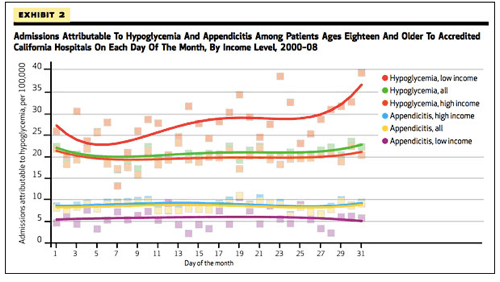Evening Must-Read: Adrianna Macintyre: Inequality and Morbidity

Adrianna Macintyre: Sometimes health policy can’t be about about health care:
Toward the end of the month, a household’s resources—income, SNAP, Social Security, and/or other benefits—can become exhausted, ostensibly changing food consumption patterns…. This chart drives the point home. Low-income individuals are at higher risk of hypoglycemia—and that risk changes over the course of a month…. Their high-income counterparts exhibit no significant trend. Appendicitis findings are offered as a “control”…. According to the authors, “hypoglycemia is one of the most common adverse drug events leading to visits to the emergency department”, and it’s been estimated that episodes of care for hypoglycemia have an average cost of $1,186. But it’s not the only condition that constrained food budgets might impact: “It is reasonable to postulate that the exhaustion of food budgets late in the month might also influence admission patterns for other diet-sensitive diseases, such as congestive heart failure.”… Policy wonks have a terrible habit of focusing on insurance and health system design (and here I count myself, because health care financing is the research I find most interesting, so it’s what I write about). This gives short shrift to the “social determinants” of health—upstream factors related to lifestyle, environment, and socioeconomic status—that cannot be corrected by medical interventions. We’re fond of highlighting how much more the United States spends on health services, but an idiosyncrasy that receives less attention is how much less we spend on other social services…

